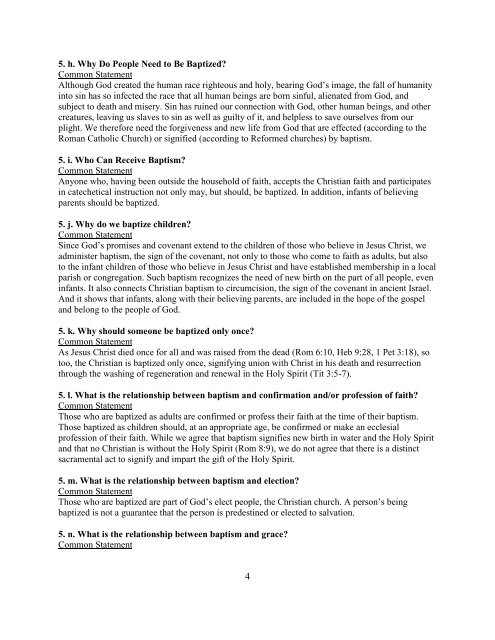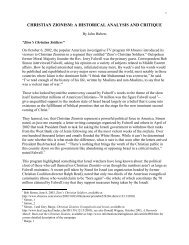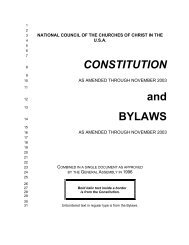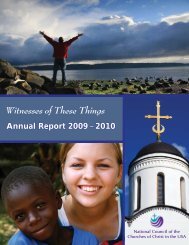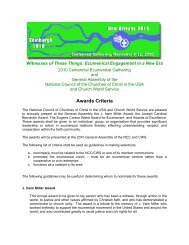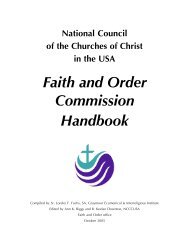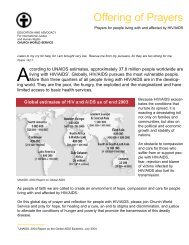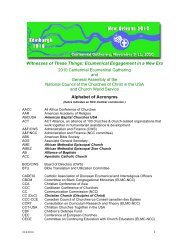Common Agreement on Mutual Recognition of Baptism - National ...
Common Agreement on Mutual Recognition of Baptism - National ...
Common Agreement on Mutual Recognition of Baptism - National ...
You also want an ePaper? Increase the reach of your titles
YUMPU automatically turns print PDFs into web optimized ePapers that Google loves.
5. h. Why Do People Need to Be Baptized?<br />
<str<strong>on</strong>g>Comm<strong>on</strong></str<strong>on</strong>g> Statement<br />
Although God created the human race righteous and holy, bearing God‘s image, the fall <strong>of</strong> humanity<br />
into sin has so infected the race that all human beings are born sinful, alienated from God, and<br />
subject to death and misery. Sin has ruined our c<strong>on</strong>necti<strong>on</strong> with God, other human beings, and other<br />
creatures, leaving us slaves to sin as well as guilty <strong>of</strong> it, and helpless to save ourselves from our<br />
plight. We therefore need the forgiveness and new life from God that are effected (according to the<br />
Roman Catholic Church) or signified (according to Reformed churches) by baptism.<br />
5. i. Who Can Receive <strong>Baptism</strong>?<br />
<str<strong>on</strong>g>Comm<strong>on</strong></str<strong>on</strong>g> Statement<br />
Any<strong>on</strong>e who, having been outside the household <strong>of</strong> faith, accepts the Christian faith and participates<br />
in catechetical instructi<strong>on</strong> not <strong>on</strong>ly may, but should, be baptized. In additi<strong>on</strong>, infants <strong>of</strong> believing<br />
parents should be baptized.<br />
5. j. Why do we baptize children?<br />
<str<strong>on</strong>g>Comm<strong>on</strong></str<strong>on</strong>g> Statement<br />
Since God‘s promises and covenant extend to the children <strong>of</strong> those who believe in Jesus Christ, we<br />
administer baptism, the sign <strong>of</strong> the covenant, not <strong>on</strong>ly to those who come to faith as adults, but also<br />
to the infant children <strong>of</strong> those who believe in Jesus Christ and have established membership in a local<br />
parish or c<strong>on</strong>gregati<strong>on</strong>. Such baptism recognizes the need <strong>of</strong> new birth <strong>on</strong> the part <strong>of</strong> all people, even<br />
infants. It also c<strong>on</strong>nects Christian baptism to circumcisi<strong>on</strong>, the sign <strong>of</strong> the covenant in ancient Israel.<br />
And it shows that infants, al<strong>on</strong>g with their believing parents, are included in the hope <strong>of</strong> the gospel<br />
and bel<strong>on</strong>g to the people <strong>of</strong> God.<br />
5. k. Why should some<strong>on</strong>e be baptized <strong>on</strong>ly <strong>on</strong>ce?<br />
<str<strong>on</strong>g>Comm<strong>on</strong></str<strong>on</strong>g> Statement<br />
As Jesus Christ died <strong>on</strong>ce for all and was raised from the dead (Rom 6:10, Heb 9:28, 1 Pet 3:18), so<br />
too, the Christian is baptized <strong>on</strong>ly <strong>on</strong>ce, signifying uni<strong>on</strong> with Christ in his death and resurrecti<strong>on</strong><br />
through the washing <strong>of</strong> regenerati<strong>on</strong> and renewal in the Holy Spirit (Tit 3:5-7).<br />
5. l. What is the relati<strong>on</strong>ship between baptism and c<strong>on</strong>firmati<strong>on</strong> and/or pr<strong>of</strong>essi<strong>on</strong> <strong>of</strong> faith?<br />
<str<strong>on</strong>g>Comm<strong>on</strong></str<strong>on</strong>g> Statement<br />
Those who are baptized as adults are c<strong>on</strong>firmed or pr<strong>of</strong>ess their faith at the time <strong>of</strong> their baptism.<br />
Those baptized as children should, at an appropriate age, be c<strong>on</strong>firmed or make an ecclesial<br />
pr<strong>of</strong>essi<strong>on</strong> <strong>of</strong> their faith. While we agree that baptism signifies new birth in water and the Holy Spirit<br />
and that no Christian is without the Holy Spirit (Rom 8:9), we do not agree that there is a distinct<br />
sacramental act to signify and impart the gift <strong>of</strong> the Holy Spirit.<br />
5. m. What is the relati<strong>on</strong>ship between baptism and electi<strong>on</strong>?<br />
<str<strong>on</strong>g>Comm<strong>on</strong></str<strong>on</strong>g> Statement<br />
Those who are baptized are part <strong>of</strong> God‘s elect people, the Christian church. A pers<strong>on</strong>‘s being<br />
baptized is not a guarantee that the pers<strong>on</strong> is predestined or elected to salvati<strong>on</strong>.<br />
5. n. What is the relati<strong>on</strong>ship between baptism and grace?<br />
<str<strong>on</strong>g>Comm<strong>on</strong></str<strong>on</strong>g> Statement<br />
4


